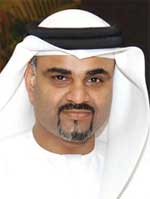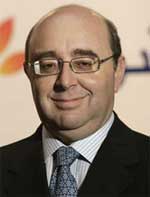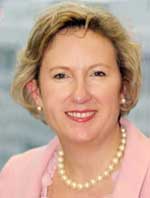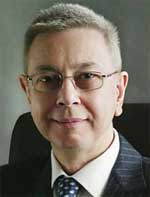The Middle East
Prudent investment of vastly increased oil revenues and a determination to build stable
financial foundations are helping transform the Middle East into one of the world’s most vibrant economic areas.
 |
|
The DIFC in Dubai: One of the key driving forces in the region’s economic expansion. |
“We have only seen the tip of the iceberg for growth in the region,” says Omar Bin Sulaiman, governor of the Dubai International Financial Center. “There will be a bigger boom in the next five to 10 years, as people keep coming to Dubai from around the world. We have to keep moving forward to the future,” he says.
The DIFC, a 110-acre site in central Dubai, was not created to repatriate the $1 trillion of Arab funds invested overseas but to integrate the Middle East region into the global economy, Sulaiman says. “We want to encourage money to flow in from abroad for the development of infrastructure,” he says. “We want the global community to be involved and to encourage diversification. What we are doing is so important that our people know they are involved in making history,” he explains.
Home to 550 companies, the DIFC is a hive of activity these days. During the current cycle of rising oil prices, a larger portion of the oil wealth is being invested in the region, and it is being supplemented by growing foreign direct investment, Sulaiman says. “The DIFC is a platform to penetrate the emerging markets of the region and vice versa. Dubai is not only for Dubai. It benefits the people and provides an environment to aim for success and achieve success,” he says.
“There is a spillover effect from the success of Dubai. Our aim is to make the regional pie bigger,” Sulaiman says. “Saudis come here and meet people from around the world and make deals over a cup of coffee,” he says.
Borse Dubai, the holding company for the Dubai International Financial Exchange (DIFX) and the Dubai Financial Market, which trades local shares, made a deal with Nasdaq in February that will see the exchanges working together to create a regional and global exchange. Borse Dubai sold to Nasdaq its recently acquired Nordic and Baltic stock exchange operator, OMX, for $1.8 billion. Nasdaq took a one-third stake in DIFX, which will be rebranded Nasdaq DIFX.
“Today, no investment bank operating in the Middle East can ignore the DIFC and the credibility and visibility it offers,” says Abdel Hamid Shoman, chairman and CEO of Amman, Jordan-based Arab Bank. AB Capital, the investment banking arm of Arab Bank, received a license last November to operate at the DIFC. “Naturally, our new license does show our confidence in and our commitment to the DIFC, but the truth is, if we wanted to become a serious player in the investment banking space, we really had no choice!” Shoman says. “We think we can bring a lot to the table, but first and foremost is our address book of medium to large corporate names and family businesses,” he says. “These are essentially tomorrow’s investment banking clients, as their businesses transform and expand—and as a new generation of entrepreneurs and professionals takes over.”
A Region in Transition
The Middle East and North Africa (MENA) region is undergoing a transformation triggered by increased oil prices leading to excess liquidity, increased foreign investments, deregulation, liberalization and a more vibrant private sector, Shoman says. “Dubai has succeeded in taking advantage of this transformation to accomplish outstanding economic growth,” he says. “Other countries in the region are keeping a close watch on the Dubai experience to learn from its successes.”
Arab Bank is one of the largest financial institutions in the world, with 400 branches in 28 countries. It won a tender in February to purchase 19% of Libya’s Al-Wadha Bank and opened two new branches in Algeria this year. Turkey and Syria are two other relatively new markets for the bank. “We do not view ourselves as a global bank, nor are we a regional bank with international aspirations,” says Shoman. “We are the premier bank of the Arab world, and our purpose is to promote our region and our clients, wherever they wish to do business.”
This oil boom has been different from the prior ones, because this time more wealth has been recycled regionally and productively, instead of just hitting offshore accounts, according to Shoman. “As the foreign assets of the Middle East oil-producing countries and their sovereign funds are now measured in trillions of dollars, you can rest assured that there is sufficient cushion to prevent a meltdown in the event of weaker oil prices,” he says.
The Gulf states of Saudi Arabia, Oman, Kuwait, Qatar, Bahrain and the Emirate of Abu Dhabi are all expected to record significant fiscal surpluses in 2008, Standard & Poor’s credit analyst Farouk Soussa, based in London, says. “By and large, these countries continue to budget prudently, using oil-price assumptions below consensus forecasts, resulting in considerable excess revenues,” he notes.
“This has been the case over the past five years, and, encouragingly, these unforeseen oil revenues are not being matched by excessive spending but have been mainly set aside in stabilization funds or sovereign wealth funds,” Soussa says. As a result, these countries’ borrowing in 2008 is mainly to finance amortizations, provide benchmark issues and maintain a level of government debt necessary for monetary policy purposes, he says.
“Times are good for everybody in this part of the world,” says Omar Bouhadiba, executive vice president and head of the corporate and investment banking group at Dubai-based Mashreq, the largest private sector bank in the UAE. “Our bread-and-butter business is very strong,” he says. Mashreq’s profit for 2007 rose 21% to $517 million. “We look at the quality of earnings, plus the quantity,” he explains. “The equation we work with is how much risk you have to take and how much money you make from the risk.”
Mashreq’s lending increased 27% in 2007, and its revenue rose by 40% from a year earlier. “We could grow the loan book faster, but we balance our strong customer focus with risk management,” Bouhadiba says.
Businesses Blooming
With so much new wealth being created in the region in the past few years, Mashreq plans to expand its wealth management activities, Bouhadiba says. The bank also is growing its Islamic finance unit, Badr Al Islami, which was set up in November 2006.
 |
|
Sulaiman: A bigger boom is coming. |
 |
|
Bouhadiba: Quality people are key. |
Meanwhile, project financings in the region are becoming so large that it forces banks to engage in syndications, Bouhadiba says. “What makes a syndicator successful is the quality of the deals that you bring to the market. The other banks know that Mashreq brings good deals,” he says.
“We also have a strategy for lending to small and medium-size companies,” Bouhadiba says. “Dubai is our town, our backyard, and it has an incredible ability to create new companies.” The single most important component to a strong corporate banking franchise is quality people, he says. “If you keep hiring quality people, you create a good environment, and it feeds on itself. Our existing staff is our best recruiter,” he says.
The competition for banking talent in the region is intense. “We go on hunting trips to Egypt and India, based on leads from our own people,” says Bouhadiba. Inflation and the high cost of living in Dubai make it difficult to attract and hold onto good staff, he adds. “It means that the last person hired is getting the highest salary, and people talk to each other and they find out,” he says.
Inflation rates will likely hover above the 5% mark across most of the GCC (Gulf Cooperation Council) this year, driven mainly by hikes in housing rents and food prices, according to a report by Bahrain-based Gulf Finance House chief economist Ala’a Al Yousuf. Real estate prices will stay firm, as delays in project completions, higher construction costs, a rapid inflow of expatriates and growth in mortgage finance accentuate supply-demand imbalances, the report says.
 |
|
Hatcher: Region will be next ETF base. |
 |
|
Shoman: No bank can ignore the DIFC. |
Saudi Arabia’s inflation rate reached 7% in January, its highest level in 27 years. The Saudi government approved a 17-point plan to fight inflation. The plan includes increasing the salaries of public sector workers by 5% every year for the next three years, raising social insurance benefits by 10%, lowering charges for government services and establishing a National Housing Agency.
Meanwhile, it is interesting to see how the variety of financial centers in the region are marketing themselves and their unique selling points, comments Imogen Dillon Hatcher, managing director of FTSE Europe, Middle East and Africa. “Dubai is certainly a vibrant place that is growing exponentially and is already the base for many international institutions and support services,” she says. “Bahrain is obviously marketing its new marina financial center hard and has some interesting benefits as a center of excellence in the field of Shariah-based investment.”
Qatar, whose economy grew a remarkable 14.2% in 2007, is promoting the high regulatory standards and business and legal infrastructure of the Qatar Financial Center. At the end of January the QFC issued a full branch license to the Industrial and Commercial Bank of China, the first to be issued to a Chinese bank in the Middle East.
“Some of the investment vehicles that are becoming commonplace in the rest of the world are starting to become interesting to the large asset pools in the region,” Hatcher says. “Just as Europe was behind the US in the issuing of exchange-traded funds and now enjoys growth of ETFs at a faster rate than the rest of the world, so the Middle East could well be the next big issuing base,” she says.
FTSE and Dubai-based Yasaar Research in January launched the FTSE Shariah Global Equity Index Series at the DIFC, with 96 new Shariah-compliant indexes. “Apart from the Shariah indexes, we are also looking at GCC-specific indexes for structured products,” Hatcher says.
Last year FTSE signed a memorandum of understanding with the Abu Dhabi Securities Market to develop indexes to facilitate the creation and listing of ETFs. The FTSE and the DIFC are also creating indexes that would attract ETF listings, Hatcher says. “We are currently updating the design of the FTSE DIFX UAE 15 index to incorporate new listings on the DIFX and to bring it to the point where we will see a variety of structured products including ETFs,” she says.
“There is a hunger for innovation in the region and a real thirst for success,” Hatcher says.
Gordon Platt



